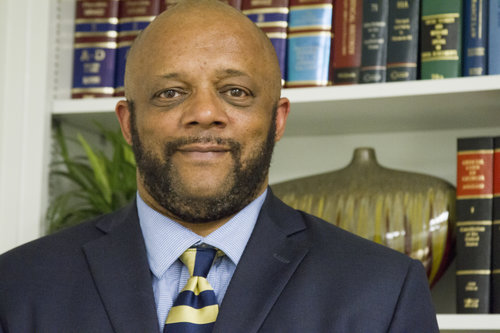Morehouse professor: Confronting the ramifications of recidivism

Dr. Gregory Price, a professor at Morehouse College in Atlanta and economist of national acclaim, will speak on recidivism at Winston-Salem State University (WSSU) at 6 p.m. on Thursday, April 19. The lecture is presented by the Center for Study of Economic Mobility (CSEM).
CSEM started last year and concentrates on researching barriers to opportunity in Forsyth County. Recidivism, sometimes repeated over generations, is one of those barriers.
John Railey, the former editorial page editor of the Winston-Salem Journal, interviewed Price for CSEM in advance of the event, which is free and open to the public.
Q: Tell us about growing up in Connecticut and what led you, as an economist, to study inmates’ re-entry into society.
I had a wonderful upbringing in New Haven, Conn. The city constitutes a part of what geographers call a “Megalopolis,” a chain of cities stretching from Washington, D.C., through Boston, Mass., such at roughly every 30 miles, you have dense urban cities. New Haven has only 120,000 people, but is 14 square miles. It has a big-city feel and culture.
As a labor economist, I am fundamentally interested in the causes/consequences of labor market choices/outcomes. As incarcerees/convicts made risky choices, I was naturally led to consider if ex-incarceree/convicts are predisposed toward self-employment, if it requires a taste for risk.
Q: Talk about the challenges of re-entry and its history. Tell the public why this challenge should matter to them.
There is social stigma associated with being an ex-incarceree/convict, which makes access to legitimate opportunity upon re-entry difficult. Because of this, recidivism becomes likely. For the public, this results in more resources being diverted toward incarceration resources that could have better and more productive alternative uses.
Q: The paper you wrote with three colleagues, “Ex-Incarceree/Convict Status: Beneficial for Self Employment and Entrepreneurship?,” is fascinating. Talk about that, especially the theory that ex-inmates aren’t as averse to risk as many others.
If one thinks of, say robbing a liquor store, think about the risk a perpetrator is taking with respect to the loss of personal liberty, and life. In this sense, most crime is equivalent to a risky gamble — much like the decision to start a business as a self-employed entrepreneur. This is the theoretical motivation for our research.
Q: Is it possible that some criminals are bright people who could make it in business but, for whatever reason, landed in drug dealing or other crime?
It is indeed likely that criminals have the traits/habits that would serve them well as entrepreneurs. One only need consider how savvy and innovative drug smugglers are. Even as the technological resources of law enforcement have increased over the years, the supply of drugs smuggled into the country by criminal drug gangs/cartels has increased dramatically, suggesting they are creative and strategic with respect to their illicit craft.
Q: Are there programs on self-employment and entrepreneurship that are working and, if so, where? Talk about them. What kinds of business ventures are we talking about? What works and what doesn’t?
While there are many such programs across the country, I am unaware of any cost-benefit evaluations of their efficacy. This is where economists can be useful, as we are interested in the extent to which labor market interventions, such as prison entrepreneurship training programs, improve labor-market outcomes.
Q: You have taught at North Carolina A&T. Are there any peculiarities to our area that make it easier or harder for such programs to work?
The geography in which Winston-Salem State University is located has one of the lowest rates of individual economic mobility in the country. I suspect this translates into relatively high incarceration rates as well. This, of course, is an empirical research question, but it raises the prospect that economic mobility, incarceration, and entrepreneurship opportunities for ex-incarcerees/convicts are interrelated in some significant manner.
Q: Talk about how the failure of re-entry programs impacts economic mobility here and elsewhere.
The social stigma of being an ex-incarceree/convict can cause recidivism. Where economic mobility is low, such as it appears to be in Forsyth county, the opportunity cost of crime is also low, which can increase incentives for crime - a vicious cycle.
Q: Are families caught in generations of economic stagnation?
Yes. There is a wide literature on intergenerational economic mobility between parents and children. The key finding is that parent’s economic status is transmitted to children. If you will, high income begets high income, and low income begets low income.
Q: What works best in confronting the problem? Public-private partnerships? Are governments at any level helpful?
To the extent that private citizens benefit from the economic growth catalyzed by entrepreneurship, the private sector has sufficient reason to encourage and support entrepreneurship among ex-incarcerees/convicts. Governments, at every jurisdictional level, should be mindful if there exist any regulatory barriers that impede entry into self-employment by ex-incarcerees/convicts. As these issues intersect, private/public partnerships seem feasible, and perhaps desirable.
Q: What are your new ideas and projects for easing inmate re-entry?
I would suggest some experimentation on provisioning start-up capital to ex-incarcerees/convicts with entrepreneurial aspirations. The results from such an experiment would inform how effective entrepreneurship is in reducing recidivism and mass incarceration. Of course, not all ex-incarcerees/convicts would become actual entrepreneurs. But those who do can also be a source of employment for other ex-incarcerees/convicts, and this suggests the effects of successful entrepreneurship among ex-incarcerees/convicts could have substantial effects on recidivism, mass incarceration, and economic mobility among ex-incarceress/convicts.
Dr. Price will speak in Dillard Auditorium in the Anderson Center on the WSSU campus, starting at 6 p.m. on April 19. Free parking is available. To sign up, go to the Eventbrite page. For more information on CSEM, go to www.wssu.edu/csem.
